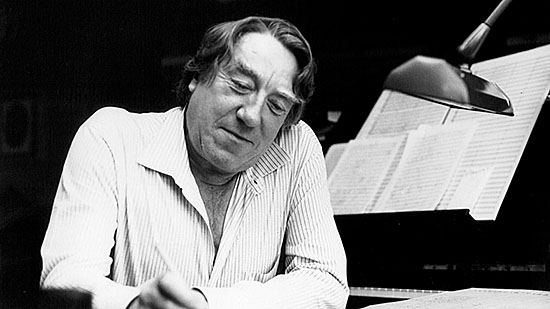March 20, 2017/Randall D. Larson
Thinking of French film composer Georges Delerue, who died this day in 1995, and his few but very notable scores within the science fiction and fantasy genre.
While being enormously prolific in films, television, and the concert hall, Delerue has written relatively few genre films. A handful of borderline psychological fantasies and shorts were among his assignments of the ‘60s, his first full-fledged genre project being Jack Clayton’s film of Gothic psychological terror, OUR MOTHER’S HOUSE (1967). Like Georges Auric’s emphasizing the childlike purity of the children in Clayton’s earlier THE INNOCENTS, Delerue also suggested the innocence of adolescents in OUR MOTHER’S HOUSE with a lyrical violin and harpsichord melody that underscored the film’s macabre events with an airy fragility. In 1971, Delerue scored the mythic Belgian fantasy, MALPERTUIS (aka US: THE LEGEND OF DOOM HOUSE), based on a novel by Jean Ray, in which he contrasted a light, lyrical oboe melody over strings and xylophone, represents the character Yann, a sailor who finds himself amid the lair of Olympian gods, against a bellowing brass chord pattern that evokes the Olympian.
 A similar mixture of lovely lyricism and deeper, mysterious presence was found in THE DAY OF THE DOLPHIN (1974), which remains one of the composer’s most beautiful scores. But the romantic fragility of his main theme, whether played by flute, strings, or plucked harp, is hauntingly attractive and unforgettable. After DAY OF THE DOLPHIN, Delerue became increasingly more involved in American productions, eventually moving to work in Hollywood full time in 1983. While most of the assignments he received were for romantic and dramatic films, he was hired to score Jack Clayton’s adaptation of Ray Bradbury’s SOMETHING WICKED THIS WAY COMES in 1982. He composed and recorded a fine, whimsical score, embodying his characteristic sense of poignant lyricism and light classical style in addition to a variety of carnival motifs, counterpointing a low-keyed and subtle composition utilizing a number of sinister calliope tunes associated with the haunted merry-go-round of Mr. Dark’s Pandemonium Circus that created an atmosphere of teasing but malevolent joviality. The score was apparently was too low-key for producers at Disney who quickly rejected the music and replaced it with something they hoped would be more popular from James Horner.
A similar mixture of lovely lyricism and deeper, mysterious presence was found in THE DAY OF THE DOLPHIN (1974), which remains one of the composer’s most beautiful scores. But the romantic fragility of his main theme, whether played by flute, strings, or plucked harp, is hauntingly attractive and unforgettable. After DAY OF THE DOLPHIN, Delerue became increasingly more involved in American productions, eventually moving to work in Hollywood full time in 1983. While most of the assignments he received were for romantic and dramatic films, he was hired to score Jack Clayton’s adaptation of Ray Bradbury’s SOMETHING WICKED THIS WAY COMES in 1982. He composed and recorded a fine, whimsical score, embodying his characteristic sense of poignant lyricism and light classical style in addition to a variety of carnival motifs, counterpointing a low-keyed and subtle composition utilizing a number of sinister calliope tunes associated with the haunted merry-go-round of Mr. Dark’s Pandemonium Circus that created an atmosphere of teasing but malevolent joviality. The score was apparently was too low-key for producers at Disney who quickly rejected the music and replaced it with something they hoped would be more popular from James Horner.
Delerue scored three episodes for the Steven Spielberg-produced television anthology series, AMAZING STORIES (1985-1987); significantly, each of them (“Dorothy and Ben,” “The Doll,” “Without Diana”) was a wistful, sentimental fantasy tale, for which the composer provided the ideal heartfelt and reflective lyrical music.
– Abridged from Musique Fantastique, 2nd Edition (Book 3, tentatively; forthcoming)

